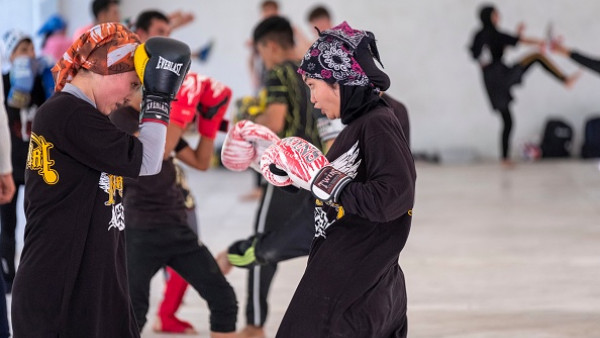The three female athletes the Taliban said it doesn’t recognise live and train outside of the country [Getty/file photo]
Afghanistan’s Taliban government does not recognise the three female athletes who will represent the country at the Paris Olympic Games this month, a spokesman for their sports department said.
The International Olympic Committee (IOC) has invited a squad of six Afghan athletes – three women and three men – in consultation with Afghanistan’s largely exiled national Olympic committee.
“Only three athletes are representing Afghanistan,” said Atal Mashwani, the spokesman of the Taliban government’s sports directorate, referring to the male competitors.
“Currently, in Afghanistan girls’ sports have been stopped. When girls’ sport isn’t practiced, how can they go on the national team?” he told AFP.
All three of the women and two of the male athletes are living outside Afghanistan.
The only one training in the country is a judo fighter, whilst his squad mates will feature in athletics and swimming.
The women will compete in athletics and cycling.
The IOC said it had not consulted Taliban officials about the team and they were not invited to the games.
Spokesman Mark Adams last month confirmed Afghanistan’s national Olympic committee – including the president and secretary-general who are both living in exile – remain “its sole interlocutors for the preparation and participation of the Afghan team”.
But Afghan committee CEO Dad Mohammad Payenda Akhtari, who is still in the country, said whilst female athletes were organised abroad, his committee coordinated with Taliban authorities over the male ones.
Mashwani claimed the government was supporting them with training and scholarships.
“We only take the responsibility for three male athletes participating in the Olympics,” he told AFP.
The participants will compete under the black, red and green flag of the old Western-backed government which crumbled after the withdrawal of US troops three years ago.
Since surging back to power in 2021, the Taliban government has enforced curbs squeezing women out of sport as well as secondary schools and universities.
The United Nations has described the restrictions as “gender apartheid”.
The IOC banned Afghanistan from the games in 1999, during the first period of Taliban rule between 1996 and 2001 when women were also barred from sport.
Afghanistan was reinstated after the Taliban were ousted by the post-9/11 invasion, but the Paris games mark the first summer Olympics since their return.
This time the IOC has taken a different approach – approving the Afghan team under a system ensuring all 206 nations are represented, in cases where athletes wouldn’t otherwise qualify.
Additionally, Taliban authorities have slashed the salaries of women government workers who have been forced to stay at home since the Taliban seized power, the finance ministry said on Monday.
After kicking out the foreign-backed government in 2021, the Taliban government stopped most women employed in the public sector from attending their offices while continuing to pay them.
“Women who are at home and do not go to the office their salaries are 5,000 Afghanis ($70) a month,” Ahmad Wali Haqmal, the finance ministry spokesman, told AFP.
Women who are permitted to work in segregated areas such as in government hospitals or schools would continue to get paid a salary according to their position.
Women had previously earned up to around 35,000 Afghanis in the public sector, including university professors forced off campus.
Administrative roles in ministries could pay around 20,000 Afghanis, although this was reduced for many to around 15,000 after the Taliban seized power.
A 25-year-old woman, who asked not to be identified for security reasons and who has worked for the Information and Culture department outside Kabul since early 2021, said her salary has dropped from 10,000 Afghanis.
“Making women stay at home is already a very big problem for us – we are in a very bad mental and psychological condition – and now that our salaries have decreased, this has only worsened,” she told AFP.
She uses her salary to support the seven members of her family, including her sick mother, but said it would barely last her two weeks.
The salary change came into effect in July and is estimated to affect tens of thousands of women who work in the public sector, the finance ministry spokesman said.


